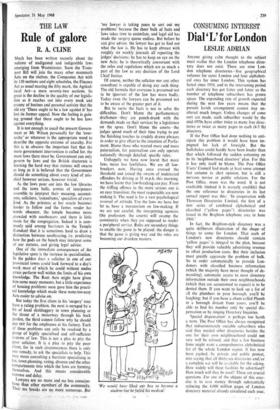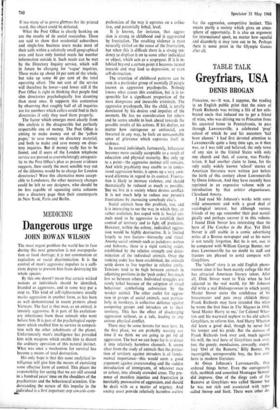Dial L' for London
CONSUMING INTEREST LESLIE ADRIAN
Anyone giving calm thought to the subject must realise that the London telephone direc- tory does not exist. There are nine Lon- don telephone directories—five geographical volumes for outer London and four alphabeti- cal ones for inner London. This system has lasted since 1954, and in the intervening period each directory has got fatter and fatter as the number of telephone subscribers has grown apace. The expanding rate of growth expected during the next few years means that the present lavish arrangement cannot stay un- altered much longer. Unless changes of some sort are made, each subscriber would by the mid-1970s have either twice as many free direc- tories or twice as many pages to each (4-5 lb) directory.
If the Post Office had done nothing to anti- cipate this problem it would have been im- pugned for lack of foresight. But the hullabaloo could hardly have been louder than that which followed the sudden cottoning on to its 'neighbourhood directory' plan. For this it has only itself to blame. The Post Office Users' Council had made at least some attempt last autumn to alert opinion, but is still a nervous novice at public relations, For the Post Office, mum was the word. It is not creditable (indeed it is scarcely credible) that the one reference to directories in its last annual report was this: 'In cooperation with Thomson Directories Limited, the first of a new series of combined alphabetical and classified ("yellow pages") directories was issued in the Brighton telephone area in June 1966.'
In fact, the Brighton-style directory was a quite deliberate illustration of the shape of things to come for London. That each of London's new directories should contain `yellow pages" is integral to the plan, because they will provide valuable advertising revenue to offset production costs. But their inclusion must greatly aggravate the problem of bulk. So in order automatically to provide Lon- doners with classified business information (which the majority have never thought of de- manding), automatic access to most directory information outside their own neighbourhoods (which they are accustomed to expect) is to be denied them. If you want to look up a list of all the plumbers in your borough, you'll be laughing; but if you have a chum called Plumb in a borough distant from yours, you'll be able to find his number only by special dis- pensation or by ringing Directory Inquiries.
'Special dispensation' is perhaps too harsh a term. The Post Office has always recognised that indiscriminately sociable subscribers who said they needed other directories besides the one for their own neighbourhood could not very well be refused, and that a few business firms might want a comprehensive alphabetical list of the whole London region. It has now been pushed, by private and public protest, into saying that all thirty-six directories and/or a complete A-Z will be available for the asking. How widely will these facilities be advertised? How much will they be used? These are crucial questions. For one of the objects of this exer- cise is to save money through substantially reducing the 4,000 million pages of London directory material already circulated each year.
If too many of us prove gluttons for the printed word, this object could be defeated.
What the Post Office is clearly banking on are the results of its social researches. These are said to show that residential subscribers and single-line business users make most of their calls within a relatively small geographical area and have only limited needs for number information outside it. Such needs can be met by the Directory Inquiry service, which will in future be charging for 'vague' inquiries. These make up about 14 per cent of the whole, but take up some 40 per cent of the total operating effort. The net cost of the service will therefore be lower—and lower still if the Post Office is right in thinking that people find slim directories psychologically less daunting than stout ones. It supports this contention by observing that roughly half of all inquiries are for numbers which callers could find in their directories if only they used them properly.
The factor which emerges most clearly from this analysis is the disagreeable but perfectly respectable one of money. The Post Office is aiming to make money out of the `yellow pages,' to save money on directory material, and both to make and save money on direc- tory inquiries. But if money really has to be found, and if users of the London telephone service are proved as overwhelmingly antagonis- tic to the Post Office's plan as present evidence suggests, then surely the most sensible way out of the dilemma would be to charge for London directories? Were this alternative more accept- able to Londoners, the other necessary changes could be left to our designers, who should be no less capable of squeezing extra columns into a directory page than their counterparts in New York, Paris and Berlin.







































 Previous page
Previous page